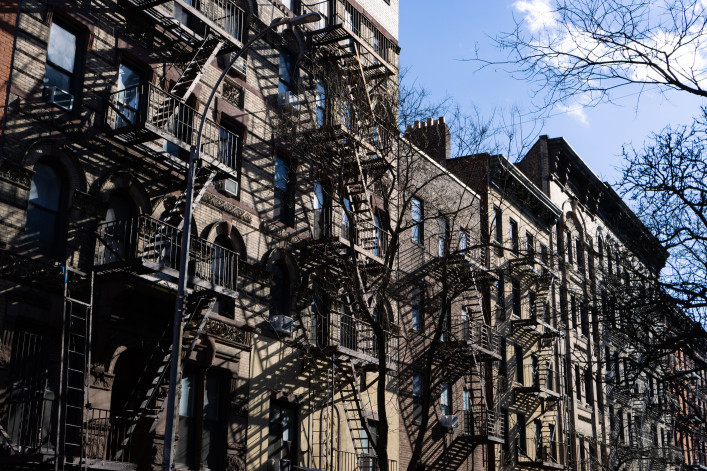Ask Sam: The size of a rent-stabilized apartment decreased, but the asking rent increased. Is this legal?
- Landlords who combined or chopped up rent-stabilized apartments were allowed to hike rents
- But New York has eliminated the 'Frankenstein' loophole, doing away with the 'first rent' rule

If the apartment was renovated and rented out before the Frankenstein loophole was closed, the higher rent may be legal.
iStock
I came across a listing for a rent-stabilized one bedroom that used to have significantly more square footage—it looks like a renovation reduced its size by 20 to 30 percent. But rent went up after the renovation, from $2,714 in 2020 to $2,928 now. I’ve read that the Frankenstein loophole that used to allow landlords to raise the rent for stabilized units was eliminated. Does this mean this apartment’s higher rent is illegal?
It’s not clear if this is a case of rent overcharge, says Ronald Languedoc, partner at Himmelstein, McConnell, Gribben & Joseph (who is stepping in for attorney Sam Himelstein for this column).
Until November of 2023, a legal loophole allowed landlords to raise the rent on rent-stabilized apartments by altering the perimeter of units. If they combined two apartments, for instance, or chopped up an existing one into smaller units, they could then charge whatever they wanted as the apartment's "first rent." The apartment would remain rent-stabilized, but at a higher rent—limited by only what the market can bear.
But in November, the state Division of Housing and Community Renewal effectively eliminated this loophole, doing away with the first rent rule.
However, in the case of the apartment you came across, the landlord may have made alterations and rented it to a new tenant before the Frankenstein loophole was eliminated.
Not clear if the new rules are retroactive
“We don’t know yet whether the new rules for Frankenstein apartments would be applied retroactively by the DHCR,” Languedoc says. “When the rent stabilization code gets amended, the owner or tenant generally raises the question of whether the change in the law should apply retroactively to a situation that occurred before the change.”
You could file a complaint about the listing with the Tenant Protection Unit and ask them to look into the legality of the apartment’s rent. The TPU could look into the timing of the landlord’s renovations and the listing of the apartment. If the landlord made the reduction to the apartment last year, for instance, but kept it vacant and is only listing it now, the DHCR might find that the higher rent is an illegal overcharge.
“If the legal regulated rent was $2,714, they would probably determine now that the new rent is that amount, minus the 20 or 30 percent reduction in square footage,” Languedoc says.
On the other hand, if the landlord made the reduction and rented the apartment to a new tenant before the Frankenstein loophole was eliminated, the higher rent could be there to stay.
“I don’t know that the agency would apply the new regulation to that situation, as opposed to if the work was just done and the apartment is only now being listed at a higher rent,” Languedoc says. “I think the DHCR might look at those situations very differently.”
Why the rent may have increased
There may be other reasons for the jump in rent, too.
“It could be that the rent was lower in 2020 because of the Covid pandemic,” Languedoc says. “A lot of units were being offered then for less than the full regulated rent.”
If that’s the case, and the landlord is now listing the apartment at its full regulated rent, that’s totally legal.
Unfortunately, there’s no way to determine exactly what happened here as someone who just came across a listing: only the owner or current tenant of an apartment has the right to look up the unit’s registration history to see its legal regulated rent.
In your case, unless you intend to rent the apartment yourself and then look into this, your only recourse is to contact the Tenant Protection Unit and have them investigate the issue.
Related:
Ask Sam: What is a 'Frankenstein apartment,' and is it legal? (sponsored)
Ask Sam: I checked my apartment's rent history and I think it was illegally destabilized. What do I do? (sponsored)
Ask Sam: How do I find out if my apartment should be rent-stabilized--and the landlord owes me money? (sponsored)
Read all our Ask a Renters Rights Lawyer columns here.
Sam Himmelstein, Esq. represents NYC tenants and tenant associations in disputes over evictions, rent increases, rental conversions, rent stabilization law, lease buyouts, and many other issues. He is a partner at Himmelstein, McConnell, Gribben & Joseph in Manhattan. To submit a question for this column, click here. To ask about a legal consultation, email Sam or call (212) 349-3000.

























